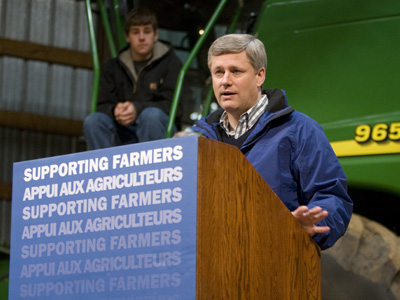Like this article? rabble is reader-supported journalism. Chip in to keep stories like these coming.
The claim: The dairy industry has nothing to worry about if Canada signs the Trans-Pacific Partnership.
With farmers rallying at Parliament, pitchforks and Holsteins in tow, it’s hard not to miss the current election discussions about free trade. Conservative leader Stephen Harper is trying shore up negotiations to sign onto the Trans-Pacific Partnership (TPP), a sweeping trade deal in the middle of the election.
Harper has maintained that dairy farmers should not fear the TPP. His government, if re-elected, would protect Canadian regulations that help support the industry.
Farming is not lucrative business. Supply management was established to help organize the industry in a way that protects producers’ livelihoods. It results in higher milk prices for consumers and predictability for the farmer from year to year. As farming conditions can change drastically based on good and bad years, the stability is critical, especially for family-run farms.
Organizing the dairy industry in this way also means that the federal government doesn’t need to subsidize the dairy industry. The Dairy Farmers of Canada argue that this avoids having Canadians pay twice: once in the store, and once through their taxes.
If Canada signs the TPP, it could mean an end to the current system for Canadian dairy farmers. The agreement is vast and complex, and negotiations are reaching to end the practice of charging an admission levy to access markets. For the milk industry, this means that the supply management system would have to fundamentally change.
The agreement would double Canada’s market share for the international dairy industry, without giving Canadian milk producers the guarantee that they will be able to access other international markets. The TPP would open a much larger market share to international markets than was considered in the Canada-European Union Comprehensive Economic and Trade Agreement (CETA). Harper is likely going to have to subsidize farmers who can prove that they’ve lost incomes because of the TPP, just like he promised during CETA negotiations. It’s no wonder: 30-50 per cent of European farmers’ incomes are from government subsidies.
Harper relies on the political support of farmers. In Québec, dairy farmers are likely to turn to the NDP to demonstrate their support for supply management. In Ontario, where dairy farmers live and work in the heartland of Conservative Ontario, Harper’s word is of critical importance.
But can his word be trusted? It only took three months to dismantle the Canadian Wheat Board (CWB). The CWB went from being a Canadian institution, governed by farmers, to having the farmers replaced by Harper appointees and sold off to American and Saudi investment and agro-business firms. They own just more than 50 per cent of the new CWB, handcuffing Canadian farmers to do business their way.
A new book to be released on Monday by the CCPA called The Harper Record, 2008-2015, argues that the changes that Harper made to the CWB will devastate Canadian farmers while benefiting huge transnational corporations like Monsanto.
The case of the CWB demonstrates what farmers can expect from Harper. If his government is re-elected with a majority, it could spell the end to the milk industry as we know it.
And, like with the CWB, the biggest winners will be large corporations, like dairy giant Saputo that has factories in the United States, Argentina and Australia.
Verdict:

Photo: flickr/ Stephen Harper




